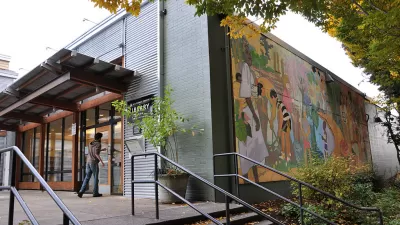"No one other than we as planners has the responsibility for decisions today that will profoundly affect others," says Attorney/Planner Dwight H. Merriam.
Dwight Merriam, a Connecticut land use attorney and planner and former president of the American Institute of Certified Planners, in a lecture at the Edward J. Bloustein School of Planning and Public Policy, at Rutgers in New Brunswick, NJ, emphasized that both social equity and the welfare of future generations must be at the core of planning practice.
The planner's clients, Merriam said, "are the poor, they are the disenfranchised, they are people who live far away but wish to be our neighbors, they are the old, they are the young, they are the people working two and three jobs who have no time to go to public hearings or run a blog, they are the people who need our help in processing and applying complex information, they are the generations not yet born, they are the people who will live on this earth 50 years and 100 years and 200 years and 500 years from now."
"When you save a sole-source aquifer," Merriam maintained, "when you preserve a critical habitat, when you make it possible for dense mixed-use development along public transit corridors that gets people out of their cars . . . and when you plan and regulate in a way that keeps our foundry worker's family from being destroyed and makes it possible for children [from low-income families] to live where they want to live and to get the education they so desperately seek and deserve, then, I say to you, you have begun to do your job as a planner."
The lecture is available as both a PDF and a podcast.
Thanks to Stuart Meck, FAICP/PP
FULL STORY: Dwight Merriam, attorney, to present annual Isadore Candeub Memorial Lecture in Planning

Maui's Vacation Rental Debate Turns Ugly
Verbal attacks, misinformation campaigns and fistfights plague a high-stakes debate to convert thousands of vacation rentals into long-term housing.

Planetizen Federal Action Tracker
A weekly monitor of how Trump’s orders and actions are impacting planners and planning in America.

San Francisco Suspends Traffic Calming Amidst Record Deaths
Citing “a challenging fiscal landscape,” the city will cease the program on the heels of 42 traffic deaths, including 24 pedestrians.

Defunct Pittsburgh Power Plant to Become Residential Tower
A decommissioned steam heat plant will be redeveloped into almost 100 affordable housing units.

Trump Prompts Restructuring of Transportation Research Board in “Unprecedented Overreach”
The TRB has eliminated more than half of its committees including those focused on climate, equity, and cities.

Amtrak Rolls Out New Orleans to Alabama “Mardi Gras” Train
The new service will operate morning and evening departures between Mobile and New Orleans.
Urban Design for Planners 1: Software Tools
This six-course series explores essential urban design concepts using open source software and equips planners with the tools they need to participate fully in the urban design process.
Planning for Universal Design
Learn the tools for implementing Universal Design in planning regulations.
Heyer Gruel & Associates PA
JM Goldson LLC
Custer County Colorado
City of Camden Redevelopment Agency
City of Astoria
Transportation Research & Education Center (TREC) at Portland State University
Jefferson Parish Government
Camden Redevelopment Agency
City of Claremont





























